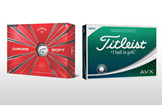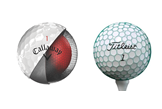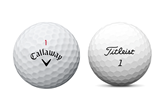TWIN TEST: Callaway Chrome Soft vs Titleist AVX golf balls
Published: Last updated:
Head to head: Callaway Chrome Soft vs Titleist AVX golf balls
Soft, low-compression golf balls are trending up. Fact. And since Callaway introduced the original Chrome Soft in 2014, they’ve bagged a decent-sized chunk of the premium golf ball market – and ignited a completely new sector in low-compression balls. To counter this, Titleist launched the AVX earlier this year. It’s their softest-feeling premium ball, so we wanted to know how the pair compare head to head.
|
Callaway Chrome Soft |
Titleist AVX |
|
|
Website |
||
|
Price |
£38 (per dozen) |
£52 (per dozen) |
|
Construction |
Four layers |
Three layers |
|
Cover Material |
Urethane |
Urethane |
You need to know:
Callaway Chrome Soft
The original Chrome Soft reinvented the golf ball. It brought soft, low-compression golf balls centre stage and was backed up with tour player usage. The 2018 Chrome Soft is the first to use ”graphene”, which Callaway says helps create a thinner, lighter crash helmet of an outer core. It means higher ball speeds, higher launch angles, lower spin and improved accuracy.
Titleist AVX
AVX stands for “alternative to the V and X”, which shows how Titleist sees it as a soft-feeling premium offering alongside the Pro V1 and Pro V1x. AVX is the softest high performance ball in the Titleist line-up, and targets the low compression market Callaway created with Chrome Soft. AVX is the lowest flying, lowest spinning ball Titleist offers.
TESTED: Titleist Pro V1 vs Mail Order golf balls

Driver performance:
Callaway Chrome Soft: 8/10
Our test pro said he couldn’t feel the difference between the two balls with a driver, so our analysis is based on data alone. Chrome Soft was 1mph slower and two yards back from the AVX, which is nothing, and not enough to make a choice between the pair. We don’t usually highlight dispersion data at TG (as it can just be a reflection of how a club or ball’s been hit on a particular day and vary drastically between test sessions), but Chrome Soft hit shots into a 13% tighter dispersion circle.
TESTED: Forged irons ranked by forgiveness
The numbers:
|
Model |
Ball Speed |
Launch Angle |
Backspin |
Height |
Carry Distance |
|
Callaway Chrome Soft |
147 MPH |
12.7° |
2433 RPM |
24 YDS |
242 YDS |
|
Titleist AVX |
148 MPH |
12.9° |
2323 RPM |
25 YDS |
244 YDS |
Titleist AVX: 9/10
In terms of simple ball speed and carry the AVX just about out-gunned the Chrome Soft. Our data shows a 1% gain in ball speed and carry in favour of the AVX, which could be argued on a different day could be reversed. Looking at our test pro’s data from an earlier TG test, peak height was 35% lower than the Pro V1, which supports Titleist’s lower ball flight claim.
Iron performance:
Callaway Chrome Soft: 8/10
Callaway reckons the original Chrome Soft was so straight, tour pros complained about not being able to shape shots into tight pin positions with it. That’s why a firmer, higher-spinning X was introduced. Like the drivers both balls are very closely matched, but this time the Chrome Soft just about tips the scales with 1mph extra ball speed, 500rpm more spin (to help stop shots on the green) and an 8% tighter dispersion circle.
TESTED: Best golf balls under £30
The numbers:
|
Model |
Ball Speed |
Launch Angle |
Backspin |
Height |
Descent Angle |
Carry Distance |
|
Callaway Chrome Soft |
124 MPH |
16.2° |
4763 RPM |
28 YDS |
42° |
185 YDS |
|
Titleist AVX |
123 MPH |
16.4° |
4284 RPM |
28 YDS |
42° |
185 YDS |
Titleist AVX: 8/10
Titleist makes no bones about saying how the AVX is designed to fly lower with less spin. We don’t hear the “lower” story much nowadays, as most brands shout about high launch/low spin, being the way forward. Our data shows both balls peaked shots out at the same height and dropped shots onto the green at the same descent angle (42°), which is reasonably shallow compared to the 45° (average angle of descent) in our forged irons review this month.

Wedge spin and feel:
Callaway Chrome Soft: 9/10
The only category where our test pro said he could feel a difference between the two, with Chrome Soft being a fraction firmer than the AVX. The Callaway produced 7% (536rpm) more backspin with a 54° wedge than the AVX, but in reality that’s not quite enough to swing a buying decision either way.
The numbers:
|
Model |
Ball Speed |
Launch Angle |
Backspin |
Height |
Descent Angle |
Carry Distance |
|
Callaway Chrome Soft |
80 MPH |
25.6° |
9220 RPM |
17 YDS |
45° |
97 YDS |
|
Titleist AVX |
80 MPH |
26.7° |
8684 RPM |
18 YDS |
45° |
98 YDS |
Titleist AVX: 8/10
Our test pro reckoned the AVX felt fractionally softer than the Chrome Soft, yet backspin numbers were 500rpm lower. Like driver ball speed and carry distance numbers, this could be different on another day, so we don’t reckon it’s enough to say there’s a significant difference to separate the pair.
Price and tour usage:
Callaway Chrome Soft: 9/10
Callaway’s massive win with the Chrome Soft has always been how it costs substantially less than the competition. Based on RRPs, Chrome Soft is 37% less expensive than the AVX – that’s hugely important for everyday golfers. The real win, though, is knowing Phil Mickelson, Sergio Garcia, Marc Leishman, Daniel Berger and Thomas Pieters all play the same ball as you.
Titleist AVX: 7/10
Premium balls allow for high mark-ups, which explains why Titleist have seen direct-to-consumer competitors spring up all over the place recently. Smaller brands can produce a top performing ball for similar costs, yet when they don’t pay tour staff to endorse them, consumers get to buy excellent balls for decent value. With AVX being a premium option it comes with a premium price tag – a £52 RRP, like the Pro V1. For club golfers who lose a few balls, that puts it at a big disadvantage compared to the Callaway, particularly when zero tour players use one.

Verdict:
Callaway Chrome Soft: 34/40
In our opinion Chrome Soft is a brilliant option for lots of club golfers. It generates the sort of soft feel golfers have come to expect from a premium ball, and won’t rattle your teeth if you thin one on a cold, frosty morning. It stacks up in terms of ball speed and distance, short game feel and spin and thanks to its low spin capabilities can help improve accuracy, too. It’s price is attractive and because a decent number of top tour players trust it to make their living you know your game is in safe hands.
TWIN TEST: Cleveland RTX 4 vs Titleist Vokey SM7 wedges
Titleist AVX: 32/40
Certainly for golfers who specifically want to hit shots lower, AVX should be considered, even though for us it didn’t lower ball flight against the Chrome Soft. When products are this closely matched for performance we have to consider cost. And the Titleist’s RRP is a lot more than the Callaway. Both balls are good, soft feel options. We feel ultimately AVX will be more at home among Titleist fans looking to join the low compression club.




